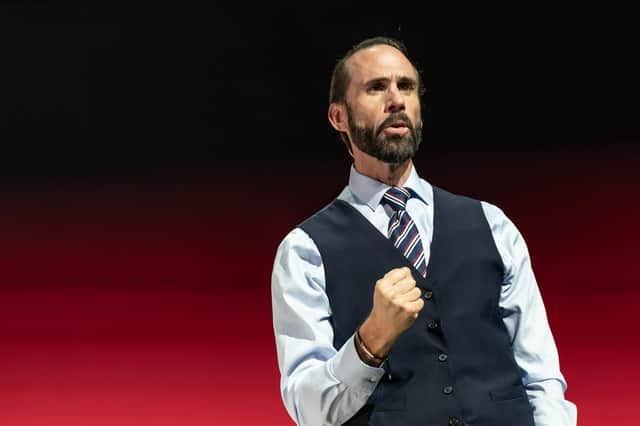Review: Dear England puts Gareth Southgate on the West End stage - but does it play a bit safe?


Writing a play about a man who's still alive is always a bold move. Writing a play about a man who's not only still alive but still in the same job, the job that has defined the man, while his level of success in said job remains a matter of debate, is another level of boldness, or perhaps foolhardiness. One way or another, this play will feel very different by the end of next summer.
Dear England is about Gareth Southgate, and his tenure as manager of the England men's football team. It is also about stories, change, trauma, fear, hope and Englishness; you can know nothing about football and still have a great night at the theatre. It is smart, sharp, funny and engaging; sometimes moving, sometimes thrilling.
Advertisement
Advertisement
But there is a sense too that its flaws are those that are often associated with Southgate, namely a desire above all for safety. This is more forgivable in football than in theatre: after all, you can lose at football. There is nothing here that scares or troubles or, frankly, surprises. The chaos of the game, its wildness and absurdity, is whitewashed.


Dear England begins with a kind of origin story: Southgate’s penalty kick in the European Championship semi-final against Germany in 1996. The German goalkeeper saved it, Germany scored with the next kick, and England were out. The experience hurt Southgate profoundly. The play then follows Southgate from his first day as caretaker manager, appointed in 2016 after the undignified departure of Sam Allardyce, through to the defeat against France in the quarter-finals of the 2022 World Cup. It takes in the fun and freshness of 2018, when the World Cup ended for England at the semi-final stage, and the more hard-nosed run to the final of the European Championships in 2021, which England lost, with grim poetry, on penalties.
Along the way, Southgate poses searching questions of his employers, his players and his country. Among his early innovations is the hiring of a psychologist, Pippa Grange, to help ease the mental strain that had long dogged the team. We see the footballers become more relaxed, open and trusting. Southgate emphasises the importance of stories; as the players tell their own, they find their voices on matters of racism and poverty. Throw in Covid and lockdowns and political mess, and the fabric of the nation looks ever more frayed. So Southgate addresses a letter to England, putting forward his own ideas about pride and identity. It is all the more stirring for its understated style.
Joseph Fiennes plays Southgate, and his performance is extraordinary. That questioning flicker in the eyes, those mannerisms that speak of a man supremely confident in his lack of supreme confidence, the awkwardly relaxed postures, those flashes of the raw passions that lie beneath the mild exterior: they are all there. He conveys powerfully Southgate’s presence, which is undeniable but unconventional: less of the alpha-dog machismo normally associated with football managers, more a deep and reflective honesty. Yes, he’s a nice guy, but he’s vastly more besides.
Advertisement
Advertisement
Dervla Kirwan plays Grange, who is part analyst, part spiritual guru. She left her job in 2019, but here reappears throughout in vaguely spectral form, as something approaching a moral conscience whenever Southgate wavers. There are times when the role veers uncomfortably towards the angelic, but Kirwan brings a welcome steeliness and groundedness. The footballers themselves are played well, with some stand-out performances: Will Close as Harry Kane is endearingly inarticulate, Josh Barrow as Jordan Pickford is maniacally energetic. Their recreation of football on stage is sharp, athletic and graceful.


Es Devlin’s set evokes the dazzle of floodlights and the unforgiving glare of scrutiny; it serves well too as a frame for on-screen action and sharp graphics. And the sound design is imaginative and effective: the rumble as penalty shoot-outs are re-enacted is suitably bowel-shaking.
But there are problems with the theatre of the thing. Much of the play feels like a dramatised documentary: for tension, it relies heavily on the automatic drama of those shoot-outs. There are attempts to generate conflict among players, staff and the FA against the new manager's new-fangled touchy-feely ways, but these feel contrived. There is precious little moral ambiguity: Southgate apart, the characters are drawn thinly. We are encouraged to laugh at anyone who criticises Southgate; this feels immature and curiously defensive. There is a tiresome suggestion that accents from north-east England are inherently funny. For some reason, Kieran Trippier, from Bury, sounds like a Londoner.
The result is a play bolder in conception than execution, about a man bolder in action than demeanour. It contrasts the absurd figures who have served as Prime Ministers in recent years with Southgate’s competence and decency; it is as if he is a kind of secular archbishop or unelected president. It stops mercifully short though of being hagiographic, and it poses just enough questions about what sport is for, and what it is to win, to leave the audience with something to ponder once the fun is over. And it is fun, which is important, because this could have been worthy and earnest: the audience played its part with cheers, roars and singalongs, and received the production rapturously.
Advertisement
Advertisement
It would be unfair to criticise Dear England for what it isn’t, and forget to praise it for what it is. After all, Southgate’s England often suffers the same fate. Whether the play really gets to the heart of this enigmatic man is questionable; whether it does more than flatter the audience’s existing beliefs is doubtful. But as Three Lions rings out inevitably at its end, it does at least make a case for hope: not just on the pitch, but in our country.
Until January 13. Visit dearenglandonstage.com to book.